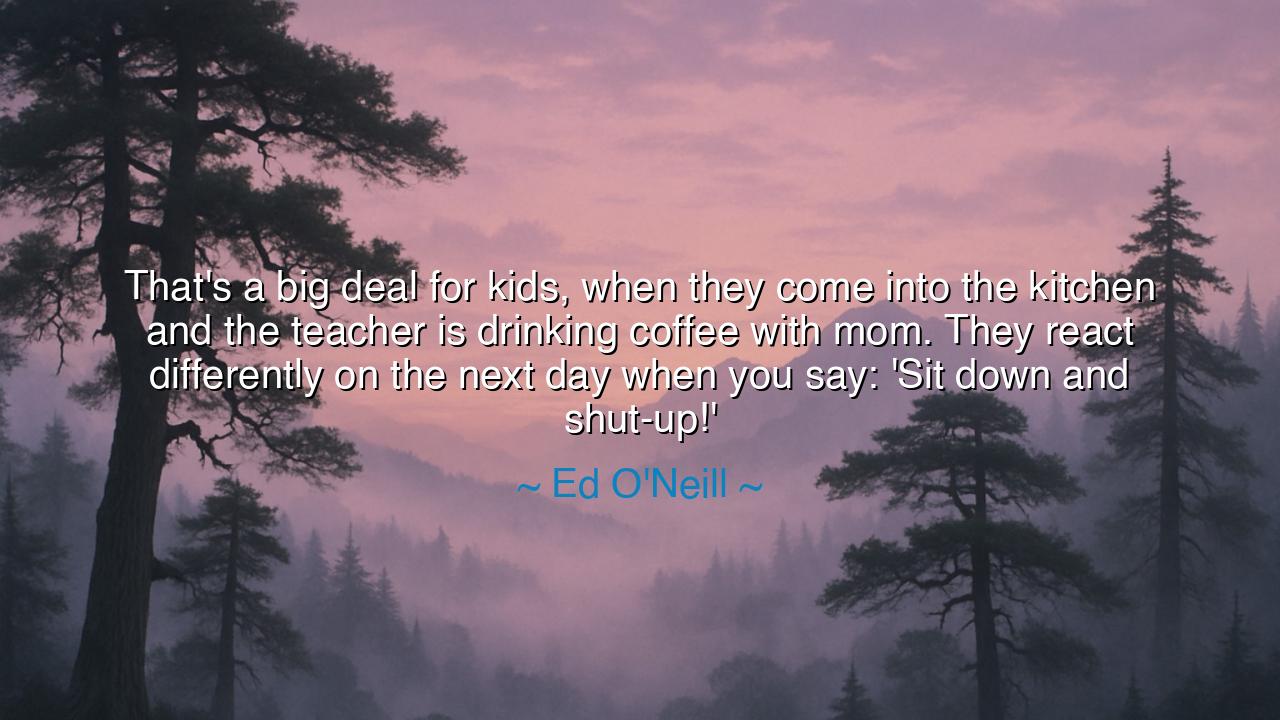
That's a big deal for kids, when they come into the kitchen and
That's a big deal for kids, when they come into the kitchen and the teacher is drinking coffee with mom. They react differently on the next day when you say: 'Sit down and shut-up!'






The words of Ed O’Neill—“That’s a big deal for kids, when they come into the kitchen and the teacher is drinking coffee with mom. They react differently on the next day when you say: ‘Sit down and shut-up!’”—at first sound humorous, but beneath them lies a powerful truth about authority, perception, and the mysterious ways respect is formed. He is not merely joking about discipline; he is uncovering how children’s view of power changes when their worlds overlap—when the figure of school authority suddenly appears within the intimate space of the home.
The origin of this thought rests in the actor’s reflections on family life and discipline. O’Neill, known for portraying fathers who balance authority with humor, often spoke of how respect in childhood is a fragile but essential thing. A teacher at school may command order, but when that same teacher is seen as a guest in the family kitchen, sharing coffee with a parent, the child perceives a web of relationships. Authority is no longer an isolated voice in the classroom; it is rooted in community, reinforced by bonds of trust between home and school.
This wisdom echoes the ancients, who taught that respect for authority is strongest when it is woven into the fabric of daily life. In ancient Sparta, for example, the line between household and civic duty was blurred. Teachers and elders were seen not only in the training grounds but also in the hearth of the community. Children obeyed not from fear alone but from recognition: these leaders were part of the same world as their parents, bound by shared values. Likewise, when the child sees the teacher and the mother united over coffee, discipline gains a deeper legitimacy.
The humor of O’Neill’s remark also masks a profound truth: respect is relational. A command shouted in isolation—“Sit down and shut up!”—might provoke rebellion or indifference. But when the child knows that the adult’s authority is connected to the trusted figure of their parent, the command carries weight. It is no longer just a teacher’s demand, but part of a broader structure of guidance and care. Authority becomes less arbitrary and more meaningful when rooted in relationship.
At the same time, O’Neill’s words hint at the vulnerability of authority. Children are always watching, always interpreting. If the teacher at coffee shows kindness and familiarity, the child may obey not from fear but from understanding. If, however, the authority is revealed to be weak, petty, or hypocritical, the bond may shatter. Thus his humor carries warning: adults must realize that children are quick to draw conclusions about respect, and these conclusions shape the success of discipline.
The lesson for us is clear: authority without relationship is fragile, but authority with relationship is enduring. Parents, teachers, and leaders must strive not merely to command but to connect. For when the child sees unity between home and school, between authority and love, obedience flows more naturally, and discipline becomes a shared path rather than an imposed burden.
Practically, this means cultivating strong ties between families and teachers, between community and school. Invite dialogue, foster trust, and let children see that the figures who guide them are not isolated voices but part of a larger, caring network. In the home, model respect for teachers; in the school, honor the parents’ role. For when authority is reinforced through visible bonds, it becomes not a hollow command but a living wisdom.
Thus, the humor of Ed O’Neill’s words masks an ancient truth: the kitchen is as powerful a classroom as the school, and respect is born not from shouting but from unity. When children see authority rooted in love and community, they obey not only out of fear but out of trust—and trust, once formed, becomes the foundation of lasting discipline and true growth.






AAdministratorAdministrator
Welcome, honored guests. Please leave a comment, we will respond soon